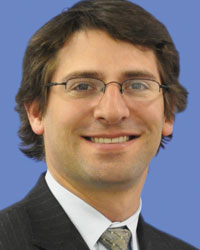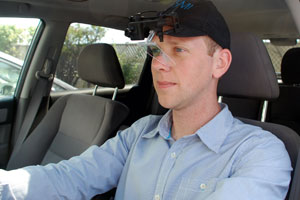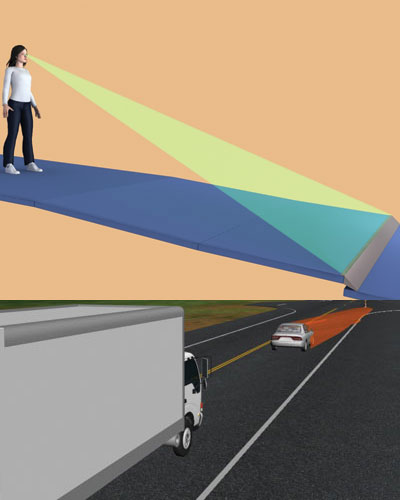Member Article
Hard Hat One Day, Suit the Next

David Cades
As a scientist in the human factors practice, my work is focused on evaluating and understanding human performance and safety in product and system use. By working to understand the limitations and abilities of people’s cognitive and human behavioral characteristics, such as perception reaction time, anthropometrics, attention, and memory, we provide insight into what a reasonable person in a given situation can be expected to do.
My journey to working in the field of human factors consulting has been filled with familial support, chance encounters, and — of course — good networking. I was first exposed to psychology at a very young age. It was actually before I was born. My mother, Amy Cades, began her doctoral program in counseling psychology when she was nine months pregnant with me. Her dissertation topic was on postpartum depression, and it was not unheard of during my first few years of life for me to be found crawling around the floor at a state-run inpatient psychiatric facility while my mother led group therapy. Fast-forward 16 years: I began to look at undergraduate programs with some thought of following in my mother’s footsteps. More specifically, I was interested in the more non-traditional applied psychological work that my mother was doing, which was interviewing applicants for positions in various law enforcement organizations. As I continued my college search, I inquired about opportunities in applied psychology at the undergraduate level.
In fact, it was on one such visit to Tufts University’s Psychology Department that I first heard of Human Factors and Ergonomics (HFE). I was touring the psychology department when a professor came up to me and offered to tell me about the various programs Tufts psychology had to offer. I was sold on HFE the second that Professor Sal Soraci described it to me in his office. I graduated from Tufts University with a bachelor’s degree in Human Factors in 2003, and two years, later I was looking to go back to school for my doctorate.

Human factors scientists and engineers measure the contribution both of intrinsic and extrinsic factors affecting driver behavior.
Prior to beginning my doctoral program at George Mason University (GMU) near Washington, DC, in the Human Factors and Applied Cognition program (http://archlab.gmu.edu), I attended the national meeting of the Human Factors and Ergonomics Society and met with my future advisor at GMU, Deborah Boehm-Davis (http://archlab.gmu.edu/people/dbdavis/). In addition to meeting my future professors and classmates, I was able to use my time at the conference to take in the breadth of the field with technical expertise including, but not limited to, surface transportation, cognitive engineering and decision making, aerospace systems, human performance modeling, product design, and forensics.
While at GMU, my research focused on understanding and evaluating how people handle interruptions and distractions in dynamic real-world environments from the classroom to the flight deck. In graduate school, I was able to work with airline pilots, the military, technology companies, government organizations, and others, as I tried to make their products and procedures safer, more efficient, easier, and more enjoyable.
As I was finishing up my dissertation at GMU, my wife began her graduate work in Chicago. While I was attending a meeting of the Chicago chapter of the Human Factors and Ergonomics Society, I mentioned that I had just moved to the area, was preparing to defend my dissertation, and was looking for a human-factors-related job. At the time, I did not have my heart set on one particular aspect of HFE. Rather, I knew I wanted to continue working in an applied setting with the opportunity to work on multiple projects. As luck would have it, at that meeting, I met Sunil Lakhiani (www.exponent.com/sunil_lakhiani), a managing engineer at Exponent in the human factors practice. At that point, I had not really considered going into human factors consulting, especially when some of the consulting was related to litigation. But this was due more to lack of exposure to it than anything else. As Sunil described the field and the job to me, it all began to sounded more interesting, and I was invited in for an interview.

Examples of recreation analyses for the available lines of sight for pedestrians and drivers.
I have been working at Exponent for almost a year and a half now, and whether it was luck or fate, I am grateful that I met Sunil at that meeting. Exponent is an engineering and scientific consulting firm with about 900 consultants covering over 90 disciplines. We perform in-depth analyses and investigations, often in multidisciplinary teams, to determine how an event occurred, or to evaluate a new product or system.
Much like the field of human factors, the breadth of projects that I have worked on at Exponent has been impressive. Since joining the company in January 2011, I have worked on projects involving both commercial and personal vehicles, industrial construction sites and equipment, household appliances, video game entertainment systems, home theater products, personal protective equipment, product warnings and labels, and aviation vehicles and systems. I have been able to go in the field and perform on-site inspections and evaluations for a number of these projects. In how many other jobs could someone with a PhD in psychology on one day, put on steel-toed boots, a safety vest, and a hard hat to go to an active construction site and on the next, put on a suit to testify in court?
One of my favorite aspects of graduate school was having the opportunity to work on multiple projects simultaneously. At Exponent, not only have I found a professional environment which supports that experience, but also each and every project presents a new set of challenges allowing me to constantly add to my breadth and depth of knowledge and experience. I work in a fast-paced, quick-turnaround atmosphere with scientists and engineers from many different disciplines who are all experts in their respective fields. It seems like each day I get to work on a variety of projects, go to interesting places, and try and make a difference for our clients.
It’s been quite a journey from the halls of a state psychiatric center to human factors consultant, with the one constant throughout being psychological science.





APS regularly opens certain online articles for discussion on our website. Effective February 2021, you must be a logged-in APS member to post comments. By posting a comment, you agree to our Community Guidelines and the display of your profile information, including your name and affiliation. Any opinions, findings, conclusions, or recommendations present in article comments are those of the writers and do not necessarily reflect the views of APS or the article’s author. For more information, please see our Community Guidelines.
Please login with your APS account to comment.